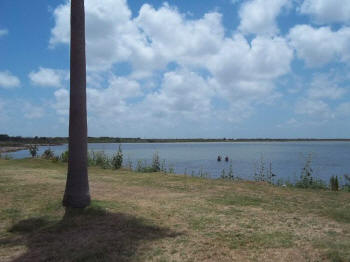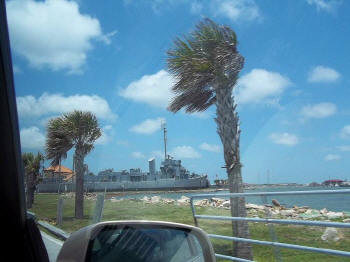|
 Pelican
Island Pelican
Island
(June 2011)
Enlarge Galveston Bay has been
repeatedly dredged and fill dirt has been used to connect Pelican Island
and Pelican Spit, so the two islands are now one island.
For today's visitor it is easy to forget the hardships endured during
those times, especially the mosquitoes and heat.
Notice this request from Capt. William W. Dawson of Company "C" Likens'
35th Texas Cavalry near the end of the war when Likens' 35th Cavalry had
been dismounted and sent to Galveston. Capt Dawson was in temporary
command of the 35th and the end was very near.
Hed Qrts 35th DisMtd Regt
May 14th 1865.
Capt Tyler)
A A Genl )
Sir,
Please instruct the officer of the day- to oblige me by furnishing a guard
to take into custody the men of companies "A" and "K" of this Regt, who
refuse to obey the order to go on duty at "Pellican Spit".
Respty
Your Obt Servt
W.W. Dawson
Capt Comdg Regt.
Transcribed by William J. Bozic, Jr. of Houston, Texas, on June 30, 2011
from the original document held by the National Archives. The
transcription was done exactly as written with no attempt to correct
spelling, grammar, or format.
Transcribers Note: Pelican Spit was the name of a small island in
Galveston Bay off the coast of Galveston near the entrance to the Gulf of
Mexico. The small island is now part of Pelican Island due to filling.
Fort Jackson with barracks and storehouses was located at Pelican Spit.
|
|
 USS
Steward as seen from near entrance to Seawolf Park USS
Steward as seen from near entrance to Seawolf Park
(June 2011)
Enlarge This photo was taken on
June 26, 2011 by my child from the passenger side of the car when we were
driving on the road to Seawolf Park. In addition to the WWII Destroyer
Escort, it is possible to see the US Coast Guard Station at Galveston
which is just across the channel. According to a map commissioned by Union
Major General N.P. Banks, the CSA forces had 25 torpedoes (mines), a
chain, and other obstructions to block the channel, as well as forts.
|
|
 WWII
Ships WWII
Ships
(June 2011)
Enlarge The name "Seawolf" is a
memorial to the USS Seawolf, which was lost in the Pacific during World
War II, but the Gato-Class submarine at Seawolf Park is actually the
"Cavalla".
USS Cavalla
The Cavalla is berthed in Seawolf Park, Pelican Island, just off
Galveston, Texas as a memorial to the lost submarine USS Seawolf. The
Cavalla was a Gato class fleet sub, designed and built in the summer of
1943 by the Electric Boat Company and launched on November 14, 1943. She
was commissioned on Feb. 29, 1944, the first "leap year" boat built by E.B.
On June 19, 1944, on her maiden patrol, she sank the 30,000 ton aircraft
carrier Shokaku (veteran of Pearl Harbor and Battle of Coral Sea). This
earned her the Presidential Unit Citation.
After the war, the Cavalla was decommissioned in 1946. She was brought
back to service in 1951 and assigned to the Submarine Squadron 10 in New
London, Conn. To meet the Soviet threat, she underwent conversion in 1952
to a new class of American sub--the SSK (hunter/killer).
On January 21, 1971, the U.S. Navy transferred possession of Cavalla to
the Texas Submarine Veterans of WWII. The Cavalla was then delivered to
her permanent berth in Seawolf Park, Galveston, Texas.
Gulf Coast locals usually refer to the USS Cavalla as the "Seawolf",
mistaking the name of the memorial park for that of the submarine on
exhibit there. Next to the sub is the USS Stewart DE-238.
There is an additional fee for entrance to the ships.
Information about the ships was obtained and modified from the Seawolf
Park Website. Photo taken June 26, 2011 by William Bozic Houston, Texas. |


